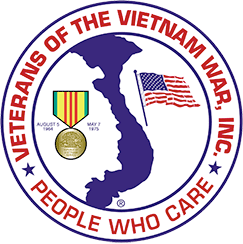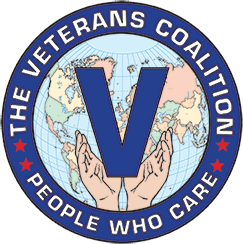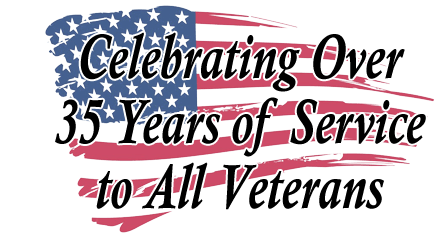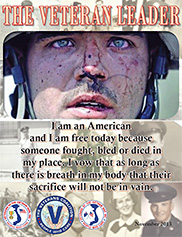

Post Traumatic Stress Disorder
This is one of the most down to earth accounts of PTSD; It is relative to Vietnam Veterans as well as Korean and all other younger Veterans. Don’t dismiss it, take a few minutes read it and get your family to read it; It will make sense and put an easy perspective on a complicated condition.
Peter Forbes
National Commander
POST TRAUMATIC STRESS DISORDER
IT’S ISSUED WITH YOUR MEDALS!
Post Traumatic Stress Disorder or PTSD as it is generally known is not something new. It has been around since Hannibal crossed the Alps more than 2000 years ago. Alexander the Great mentions experiencing many of the symptoms of the disorder in the journals of his epic feats, as does Shakespeare in some of his writings.
In times past it has been called shell shock, battle fatigue, and lack of moral fibre to name a few of its names, but for Vietnam Veterans it appears to have had a number of differences. It hits harder and recovery from its effects has not been as easy as in the past and the fact that it has taken 30 years or more to become apparent in some Veterans is quite normal.
It is not restricted just to Veterans. It is caused by experiences outside of normal exposure. Victims of violent crime will probably experience it, as will members of the Police and Emergency Services who are exposed to scenes of terrible mutilation or injuries and useless loss of life.
Victims of accidents, earthquakes, floods and bush fires, to name a few instances of major trauma, also suffer from the disorder. The mind just does not want to accept what happened. For many of these people recovery is fairly predictable and can be expected to occur in a reasonable period of time. For us Veterans this is not generally so, probably because we had to just soldier on, living constantly under the threat of death and mutilation.
The differences between Vietnam and past wars are too numerous to list but here are a few:
The enemy looked and dressed the same as the people we went there to help. His attitude to life was different to ours and he was quite happy to die for his cause. He was quite willing to give a five-year-old child a grenade and tell that child to remove the pin and drop it when he or she was among a group of us. At Phan Rang where I served, grenades (with the pins pulled) were found beneath several layers of oranges in the mess on more than one occasion.
Among the bodies found on the perimeter after an unsuccessful attack during the ’68 Tet Offensive, we found one of the barbers from the airbase PX and the head civvy (Civilian) laborer employed by my unit! Further, papers on the latter showed him to be the VC commander! Similar instances could be related everywhere, I’m sure.
Our involvement in Vietnam was unpopular particularly due to conscription and a small minority at home whipped up emotions to the point that on our return home the public and often even our own families took their feelings out on us rather than on the government that sent us. Murderers and baby killers were frequent taunts. We had eggs, paint, blood, and rotten fruit thrown over us and even our superiors advised us not to wear our uniforms when not on duty, certainly not our ribbons.
Even the Returned Services League (like the Legion) turned their backs on us. We came home thinking we had joined the ranks of the ANZACs (Australian and New Zealand Army Corp and they didn’t want to know us.
Unlike them we had no welcome home parades either and it was not until 1987 that the RSL, the government and the population at large decided to recognize our achievements and finally give us a welcome home parade - 25 or more years late - too late for many.
The oldies at the RSL said we had not been in a real war and were only away for a year anyhow. But then we were not relieved by another battalion every couple of weeks or after a battle and sent into reserve. We had no reserve.
For all Vietnam Vets their year was at the front even if not in the thick of it. Regardless of our jobs in Vietnam they (the oldies) cannot generally make any comparison. And if it was not a real war as they said, give us back our dead mates and mend our battered bodies and minds.
Next, the way we came home - for the old diggers (GI’s) it generally took several months to come home by sea, time to unwind with their mates. Then they went into camp at racecourses and show-grounds etc. with more time to readjust before they were finally demobbed.
For many of us we came home in dribs and drabs, not whole units and never saw the mates we served with again. And just as we had left, we came home in the middle of the night as though we had done something shameful and should not be seen. For many too, the time between last shot fired or feared was less than 48 hours. How could you be expected to adjust normally?
The older Veterans went to war as a generation and so when they finally recommenced civilian life they had the advantage that their neighbors and the blokes (guys) they worked with had all been through similar experiences. - Hundreds of thousands of them. Even their local Doctor had probably served as well, so they were all understanding of each other and mutually supporting.
The Vietnam Veteran was all on his own and for many they went through the process two or more times.
It would not be possible to describe all the reasons why the Vietnam War was so different from past wars, but suffice to say Australian, New Zealand and American Veterans are all having the same problems and to many of us, PTSD has become a way of life. Sadly, each day more Veterans succumb to it, even after all these years.
Diagnosing PTSD is not all straight forward and there are many differing opinions about it. It may be called any of a number of things but the point is, it is due to your Vietnam service and something can be done about it with positive results.
The disorder is a combination of physical and mental symptoms and is best treated by a psychiatrist who is a doctor of both the body and the mind rather than a psychologist who is skilled on theory. The psychiatrist can also prescribe medication which will help in the treatment of the disorder.
The following symptoms came to light following two separate enquiries of the Royal Commission on Agent Orange. Do these things seem familiar?
| Loss of sleep Loss of weight |
Nightmares |
This list was shown in the book Vietnam Remembered;
|
Flashbacks to terrifying events |
Headaches
Low back pain |
You will note that this time there is a mixture of physical and mental symptoms and so you should see that a Psychiatrist is a logical practitioner to see. However, from the point of claiming pension and medical treatment from the Department of Veterans Affairs you should claim each of the physical symptoms separately. This is most important.
Anxiety is common to both the above lists and different psychs may see PTSD as a separate issue. Others will say anxiety is just one of the symptoms. It does not matter in the long run in the same way as alcoholism may be taken as part of PTSD or due to it. The symptoms of anxiety are many and various and may duplicate real medical conditions. Look at my case.
My introduction to anxiety was what appeared to be angina (heart pain), and the pain was controlled by nitroglycerine tablets. When I began to have as many as 14 angina attacks a day and an ECG showed signs of scarring in the heart I was advised to stop work immediately. (My Doctor thought I was on 100% disability pension as well as my military super-annuation pension and thought I was working just for fun.)
I thought I was going to die if I didn't, so I took his advice. (Bad move but never mind)
After two years with no stress and not a single angina attack I went back to work as a civilian security guard at an airforce base. (Another bad move)
Before long things became far worse than before and with a whole lot more symptoms. I took leave and attended a reunion in Brisbane. Had a great time but on my return to work found they were playing war games all around me. I lasted only two more days.
Diagnosis ... acute delayed anxiety state with panic attacks - later changed to severe PTSD.
I am unable to work and fall to pieces with the slightest stress. Even making a cup of coffee is sometimes a difficult task! The only time I am fully in control is helping Vets in need of support.
The symptoms of anxiety are too numerous to fully list but ask yourself these questions to find out how you are traveling:
- Do you find it difficult to relax and sit still or are you constantly fiddling with things. Indeed are you a workaholic?
- Do you find you are constantly prowling around looking for nothing in particular or just pacing backwards and forwards, in short, always on the go?
- Do you find that you are easily irritated by things that people around you do and have trouble keeping yourself from spitting your dummy out at them?
- Do you worry a lot even about little things and fear that everything is going to turn out wrong?
- Have you become afraid of the dark and fear going anywhere at night?
- Are you afraid to go out now and find you become restless and agitated in the presence of strangers or when going someplace for the first time?
- At these times and among crowds do you find you have difficulty focusing your eyes, get headaches and/or pains in your chest, arms or legs?
- If you eat out or go to a pub do you find you must sit where your back is covered, have a clear line of escape and can generally keep an eye on everything?
- Do you find when you go out that you need a couple of quick drinks before you relax the slightest?
- Have you become afraid of driving in traffic and has your driving skill deteriorated. Are you with it?
- Have you become impatient and short tempered?
- Are you easily raised to the point of anger and even physical violence?
- At night do you find you are frequently checking to be sure the house is securely locked up?
- Do you often check out of the windows to see if anyone is snooping about?
- Do you sit up late at night watching TV even though there is only rubbish on, delaying going to bed, delaying going to sleep and therefore, the dreams and nightmares? Or do you spend all night on the Net for the same reasons?
- Do you sit there drinking as well; your fears have mellowed out in the alcohol haze?
- Do you smoke pot or take drugs including prescription drugs or sleeping pills for the same reason?
- When you do go to bed, do you have trouble going to sleep or do you have a non run of things over and over in your head?
- Is sleep, when it comes, broken or full of dreams and nightmares? Are you refreshed when you wake or rather do you feel exhausted?
- Are your dreams so real that you leap out of bed and go and watch TV again, safe in the knowledge that you are at home in Australia or the U.S.?
- While awaiting sleep in bed, do you have a ringing in the ears?
- Can you hear your heartbeat?
- Does it skip a beat now and then. Do you think it will stop!
- Do you grind your teeth?
- Do you find it hard to relate with anyone who is not a Vet, family or a close friend or service person?
- Do you find it difficult to display your emotions towards people?
- Do you have realistic flashbacks of traumatic events in Vietnam?
- Do you sometimes have a continuous playback of an area of ground you covered on your first operational patrol or another patrol that did not necessarily involve enemy contact? Is that where you first thought you were going to die?
- Do you keep your feelings to yourself and block everyone else out including those nearest and dearest to you?
- Do you sometimes feel so depressed that life seems no longer worth living?
- Has suicide sounded like a good way of escaping things that are getting you down?
- Have you lost interest in sports and hobbies that you once were very active in?
- Have you lost your sex urge or old performance level?
- Do you sometimes have guilt feelings about any aspect of your Vietnam tour?
- Are you often dry mouthed or do you have nervous tics and twitches or hot and cold flushes?
- Do you find you often sweat without exertion even in cool weather?
- Are you adversely affected by the sound of helicopters, sirens or loud noises reminiscent of weapons firing and explosions?
- Are you easily startled to the point you feel real fear, even terror?
- Do you have a memory and concentration problems?
- Is your attention span short and are you easily confused?
- Are you a member of a Veterans organization but never go to meetings? If you do, do you shy away from office for fear of making a fool of yourself?
- Have you lost confidence in yourself?
- Do you find your hands shake if you think someone is watching you?
- Does your voice sound tremulous and in the worst case do you think you will choke on your tongue and the more you try, the worse it gets?
- Do you find you are easily moved to tears and sometimes burst out for seemingly no reason at all?
- Are you having marital and job problems and generally your life has turned to shit and you can't work out why?
Well, old comrade, welcome back at last to the real world of the Vietnam Veteran. You are now qualified for full membership of the club and I have to tell you that things may get even worse for a time. But don't pull the pin because there are thousands of Vets all the same as you and they will give you all the support they can.
If you agreed that a lot of the questions applied to you and the list is nowhere near complete, then it would seem you have an anxiety, depression or PTSD type problems like all the rest. So what do you do about it?
First, you need to see your local medical practitioner or one who is known to be Vet friendly. Most Veteran's organizations can point you in the right direction, or if you have a mate (Veteran Friend) who has the same problem, ask him who he saw.
Tell the Doctor what you have been experiencing and ask him to refer you to a psychiatrist. If your mate or Veteran's organization gave you a particular name ask for referral to him. You need a shrink who knows the particular problems of Vietnam Vets.
@#*@^##*&! No way!!! I am not crazy and ain't no way I'm gonna see no shrink!! No you're not crazy but a psychiatrist is the professional who can turn your life around for you. You see an ENT specialist if you have consistent sore throat, a neuro surgeon for a crook neck and a bum doctor for piles. For anxiety and PTSD you see a shrink. OK?
The perception we have of shrinks on TV is unreal. There are no couches or swinging watches or flashing lights. He is just a doctor who asks a lot of questions along the line of what you have already answered here.
He will ask about your Vietnam service to establish your exposure to trauma and then later more to establish what effect that trauma had on you.
Generally speaking, if he hits a raw nerve and sees you suffering he won't dwell on it then but may come back from a different angle next time. As soon as he has established what he needs to know to help you he will let it drop so as not to cause you further misery.
When you see him first up tell him you wish to file a claim with the Department of Veterans Affairs and ask him to prepare a report for you own doctor.
Make it a rule to ask for your own signed copy of the report. It is important for you and whoever assists you doing the claim paperwork to know what he and indeed any medical specialist has to say.
You will need to see him at least 3-4 times to establish your case - more to treat the problem. It's free.
Please remember there is no stigma involved in seeing a shrink. He is just a head doctor and most Vets are already seeing one. You may be sick but you are not crazy although making light of it can help.
In Newcastle (Australia) where I live we have a club called the Sky Walkers. You get a badge and certificate certifying you are crazy and "off the planet most of the time."
In Darwin a few years back, I overheard two Vets talking, one claimed proudly he had just come out of a Psycho ward after a three-month stay. The other said that was nothing, as he had spent 20 years in there! They were as proud of that as if they had gotten a new medal for it.
It is a sad and serious matter but better to make light of it than let it pull you down.
No one will claim he can cure your problem but certainly it can be made easier to live with by counseling and medication and the support of family, friends and your fellow vets. Just knowing you are not the only one also makes a big difference.
As you and you family and friends begin to understand the problem it will not seem quite as crushing as perhaps it was. (After all we now know you are a Vet with PTSD not just a b@#$#%*) - (Good for one try only!)
Further, when you go off the rails next time they may accept that you meant them no harm, it was the Vet that did it and he didn't either.
There is not much more I can say, but I do suggest you have your family and friends read this as well.
It may help them understand you better and it could help rebuild a burnt bridge or two. Just as important they will pick up on things about your behavior that you cannot see and with their combined input maybe you will get things sorted out.
I have produced this paper with the best of intentions to help you. I am no expert but believe I get close enough to the mark to be of constructive assistance to you. Certainly I have been able to help a great many in the past, but not being an expert I will not accept responsibility for anything which may occur as a result of you reading this.
A warning or two -- firstly, I would suggest that until things settle down you take another driver with you when you go to see the Psych. You may find it quite disturbs you although you'll get used to it. Australian Vets can ask their doctor to arrange for free taxi from Veterans Affairs if your level of anxiety is excessive.
Secondly, do not attempt to learn by heart all the symptoms and questions I have listed here. If you do not have the problem you will not fool the shrink and you will only compromise yourself and your claim.
Lastly, things may seem to get worse, indeed they most probably will as you go to battle with the Department of Veterans Affairs but I assure you, it will be well worth it in the end.
Forgive the errors, I have a problem too.
Good Luck.
Yours in Brotherhood,
Lawrie Gay
NOTE:
Lawrie Gay is the Regional Director for New South Wales for the Veterans of the Vietnam War, Inc. & The Veterans Coalition in Australia. If you would like additional information you can contact Lawrie at the website address for the VVnW, Inc.& The Veterans Coalition at
This email address is being protected from spambots. You need JavaScript enabled to view it.
.
Related Links:





